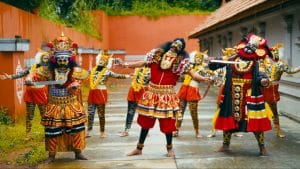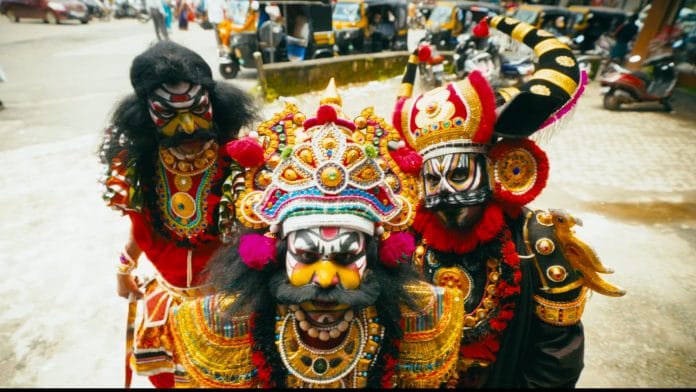New Delhi: Udupi is a name associated with two defining attributes for outsiders — Manipal University, and the coastal town whose name has become synonymous with South Indian restaurants. But in G Vishnu’s Kannada language film Rakkasa, Udupi becomes the setting to explore questions of belonging, aspirations, communal tension, and friendship.
Rakkasa is set during the Udupi Krishna Janmashtami festival, which takes place a month after the celebrations held in other parts of India. Pakku (Avinash Rai), a painter; Reepu (Rohith Baikady), a Muslim mechanic; and Santu (Bhuvan Manipal), an autorickshaw driver, are close friends who spend a day fishing and then drinking at a local bar, talking about “missing the bus” when it comes to leading better lives. They stumble upon a desi cosplay event — dressing up as a demon or rakkasa — to win a cash prize of Rs 1 lakh. How they participate in the event, and how it changes their lives, forms the crux of the 38-minute film, which has been presented by Kannada actor and producer Dhananjaya’s Daali Pictures.
“In a town which has a lot of people with remittance money, and where the divide between the haves and have-nots is wide, economic anxieties hit hard. Furthermore, the festivals and fairs in recent years have been marred by calls for ostracisation and boycotts of minority communities by Hindutva groups. That was the subtext in the movie, but [it was] also [about] how festivals and food bring the town together and [create] the sense of belonging,” said Vishnu.
Based on a short story by his brother G Raghunandan, the film is written and directed by Vishnu, a former investigative journalist. His own experiences of living in Udupi, before moving away for work, and then returning home, shapes the narrative of the three friends.
But unlike the traditional understanding of the rakkasa, which also appears in the beginning of the film as a dictionary entry, the filmmaker focuses on the demons that plague Udupi today.
The film was shot in four days, with all festival visuals captured in real time during the actual celebrations. The filmmaker highlights the everyday rhythms of life and the spirit of the city, especially during Janmashtami, which is central to Udupi’s socio-cultural identity.
The two Udupis
One of Vishnu’s inspirations for the film was the dichotomy between local people and the outsiders who come to study at Manipal Academy of Higher Education, a private university. Vishnu himself had lived two different lives — one as a local, and another as a student at a “fancy” university.
“One thing I have always observed is that Manipal and Udupi are like two worlds. Manipal is where the affluent live, and Udupi is where the aspirants live. Students from less privileged backgrounds go to Manipal during the day, and work at night at pubs and restaurants. They form the new aspiring class,” said Vishnu.
In an early scene, as the trio roast crab and fish, they hear the sound of an expensive bike and recognise the rider as someone from their own class.
“When did Naveen buy a cruiser bike? He was neck–deep in debt some time ago,” says Santu.
Reepu responds: “He works at one of those fancy Manipal pubs,” adding that Naveen also speaks English, which gives him an edge.
The conversation highlights how Naveen’s choices have given him a better life than the three friends.
“I am not envious, but a question keeps creeping up on me–how did we miss the bus?” says Pakku.

While Reepu and Santu at first take time literally, the scene is poignant, capturing the dreams and frustrations of what Vishnu calls the “have-nots”.
Vishnu drew from his own interactions with people to shape the characters beyond the short story.
“Almost every single character in the film is inspired by or based on a real individual. For instance, I go to a gym frequented by the working class. One of my friends there is a construction painter. If he weren’t painting walls, he would have been an artist, because he is really gifted and wants to get into animation. But the cost of the course means he will probably never make it beyond his current situation. That inspired the character of Pakku,” said Pakku.
There is also mention of Dubai, the popular destination for migrant workers from South India, with Santu even repeating the tagline, “Habibi, come to Dubai.”
The other two characters are also based on real people Vishnu has known in Udupi. The Muslim mechanic, for instance, is inspired by someone he knew as a child, who once dressed up as a rakkasa. The story highlights how intertwined the lives of Hindu and Muslim communities once were in coastal Karnataka, something that is now changing with rising communal tensions.
Also read: Raghu Dakat vs Raktabeej 2. The big Durga Puja box office battle in West Bengal has a winner
The festival of belonging
As the three friends don the costumes of rakkasas and go around the city collecting ‘chanda’ (donations), they enjoy a day free from worries about their jobs and lives, because the whole town is immersed in celebrations. It’s part of Vittal Pindi, with glimpses of the Tiger Dance (Huli Vesha) performed during the festival that commemorates the childhood antics of Lord Krishna.
As Santu struggles to fit his demon head into the auto, and as they bravely combat other people dressed in costumes for money — plus a pet dog that chases them away — the three friends give a glimpse into the city’s vibrant culture.
But their dreams of winning are dashed when the competition turns out to be a scam. Dressing up as rakkasas also has consequences for Reepu, given his religion. Though Vishnu does not explore these repercussions in detail, the mere mention throws a spotlight on the reality of rising communal tensions — not just in coastal Karnataka, but across India.
Vishnu was very clear from the beginning that the film would be a comedy. It was both a creative decision and a way to ensure the short film’s visibility. But he layers the comedy with serious questions — about economic hardships, limitations of professional growth, and communal strife.
“I wanted to confront the issues of Udupi not by making a ‘serious’ film or giving speeches. I wanted people to have fun, and if they are willing, we take them to the deeper end. But if they don’t want to ponder over issues, they can simply laugh too, and that would be okay as well,” said Vishnu.
In the end, the only answer, if there is one, is the deep friendship between the three men, which survives everything, including the demons of intolerance slowly circling their town.
(Edited by Prashant Dixit)






